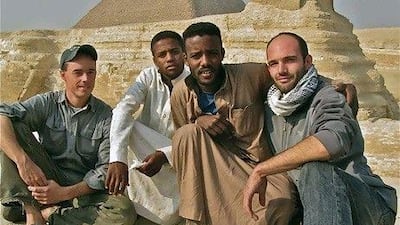CAIRO // It was near the Nile river village of Naga Hammadi where two Nubian crew members tried to take off with the wooden sailboat, making use of a brisk wind to dart away from its American owners.
"At first, we thought there was a mutiny," recounts Joshua Maricich, one of the two adventurers who were making their way up the Nile on an Egyptian felucca named Jasmine. "But we realised it was just nerves. It was a long day and they wanted to show us that they were in control."
Thus went just one of the dozens of adventures of Mr Maricich and Will Raynolds on their remarkable sailing journey in Egypt, from the southernmost city of Assiut to Cairo late last year. At the time, Egypt was disrupted by protests against the military in the aftermath of the uprising that forced Hosni Mubarak to resign.
When their careers left them stranded in Cairo by the revolutions in Yemen and Libya last summer, the two men hit on an idea for a project while sitting in a downtown bar.
"We had the idea to buy an old felucca and sail the length of the Nile in Egypt," remembered Mr Maricich, 31, a journalist who was deported from Sanaa earlier in the year by the Yemeni government for reporting on the protests there.
"The idea was that there was so much going on in Cairo after the revolution. We wanted to explore how it was affecting the rest of the country."
A felucca is an old-fashioned sail boat that dates back centuries, when it was used for light shipping and transportation on the Nile. In recent decades, it has served primarily as a leisure cruiser for tourists taking in the breeze on a visit to Cairo or for short ventures between historic sites in Upper Egypt.
Mr Maricich's partner in the venture was Mr Raynolds, 29, an archaeologist who was unable to return to Libya during its uprising against Muammar Qaddafi. The two had met in 2005 as Fulbright scholars in Jordan, where they first began travelling to far-flung cities and countries in exploration of their shared passion for the Middle East.
After preparations, they embarked in September to the Aswan with a fistful of Egyptian pounds, a couple of rucksacks, and laptops. With tourism decimated in Egypt, particularly in the historic cities of Upper Egypt, they easily found a felucca owner, Abu Ayman, who was willing to part with his boat for some much-needed cash.
Mr Maricich and Mr Raynolds also hired the owner's son, Ayman and a first-mate Atham, to crew their boat on the 1,287-kilometre journey north. The trip was chronicled on a blog: On the Nile: Two Americans Set Sail in Search of the New Egypt (http://thenewegypt.tumblr.com/).
They discovered along the way that the effects of the January 2011 uprising continued to ripple across Upper Egypt,
"While there was this sense of excitement in Cairo, there was a feeling in these villages that Tahrir was still just an idea," Mr Raynolds said. "There were suspicions and a sense of being held hostage to something far away."
In Aswan and Luxor, the livelihoods of many of the tourism workers that provided for the majority of the population had been decimated. As the two adventurers ventured into Middle Egypt, closed to visitors by the Mubarak regime since the 1990s because of its suspected harbouring of Islamic extremists, they found proud communities that hoped the revolution would spread prosperity beyond the capital.
But their journey also revealed a collection of oddball characters, such as the police chief who made his eyes wiggle to "scare his men", and rare cultural experiences, such as the rowdy wedding of a couple in Gebel Silsala where the stage collapsed just as the party was getting started at 3am. They witnessed sunsets on quiet stretches of the river, as fishermen trawled alongside barges of molasses. Children swam in bathing suits made from plastic shopping bags.
"It was really a beautiful experience," Mr Raynolds said, adding that he was later surprised to find echoes of their trip in a similar journey by an American in 1940 that was detailed in an article in National Geographic. "Some of the villages had a timeless feel."
The American men grew closer to their crew members, despite the suspected mutiny that day in November that turned out to be the physical manifestation of Ayman and Atham's exhaustion from the journey. Efforts to teach the two crewmen English morphed into how to woo western women visitors. The recommendation: pickup lines from Shakespeare.
Finally docking in the Cairo neighbourhood in Maadi on November 30, they reluctantly said goodbye to their crew and are now on an extended break. But the next chapter is still to come: sailing from Cairo to Alexandria, stopping along the way to visit the Nile Delta towns of Lower Egypt before seeing the Mediterranean Sea.
Follow
The National
on
& Bradley Hope on

